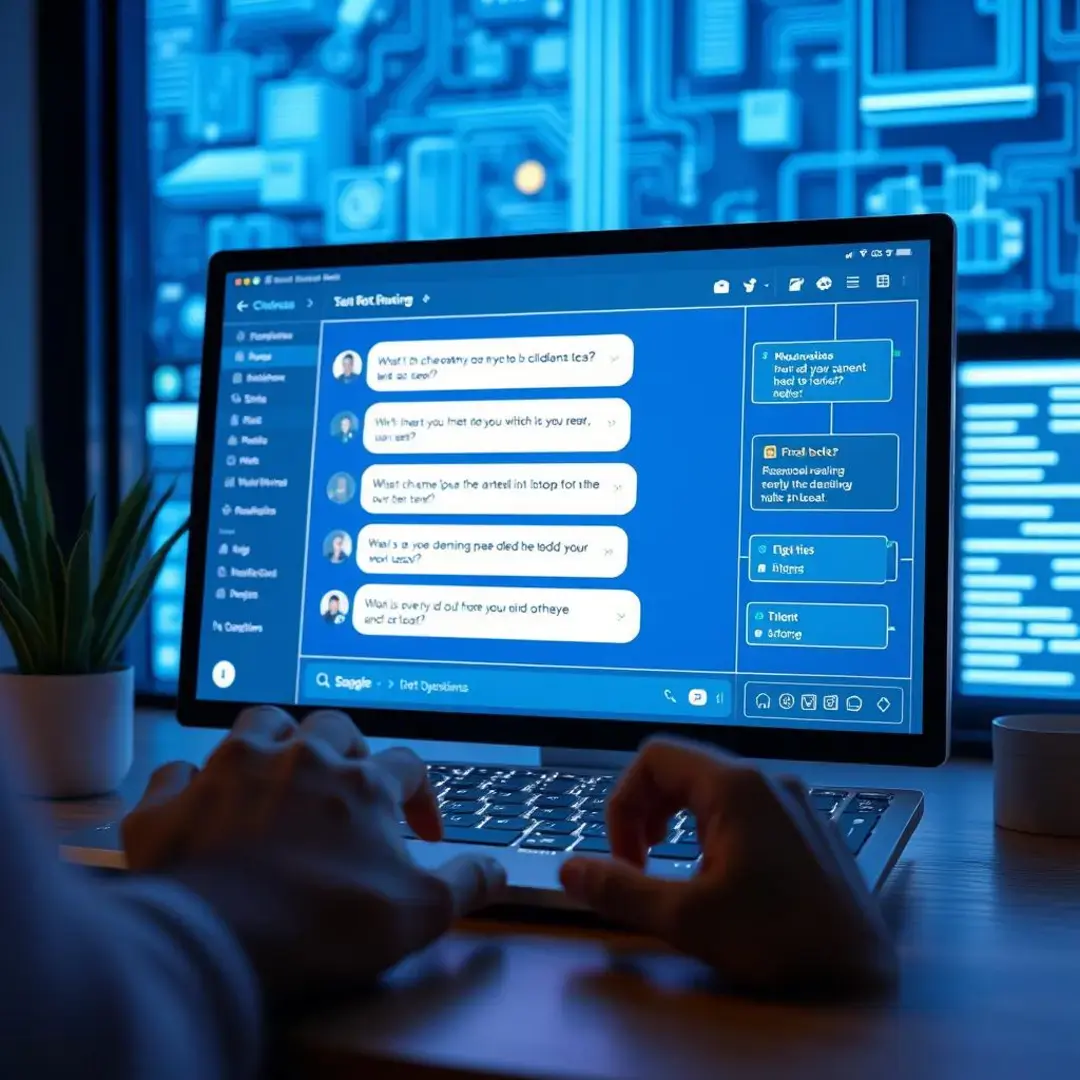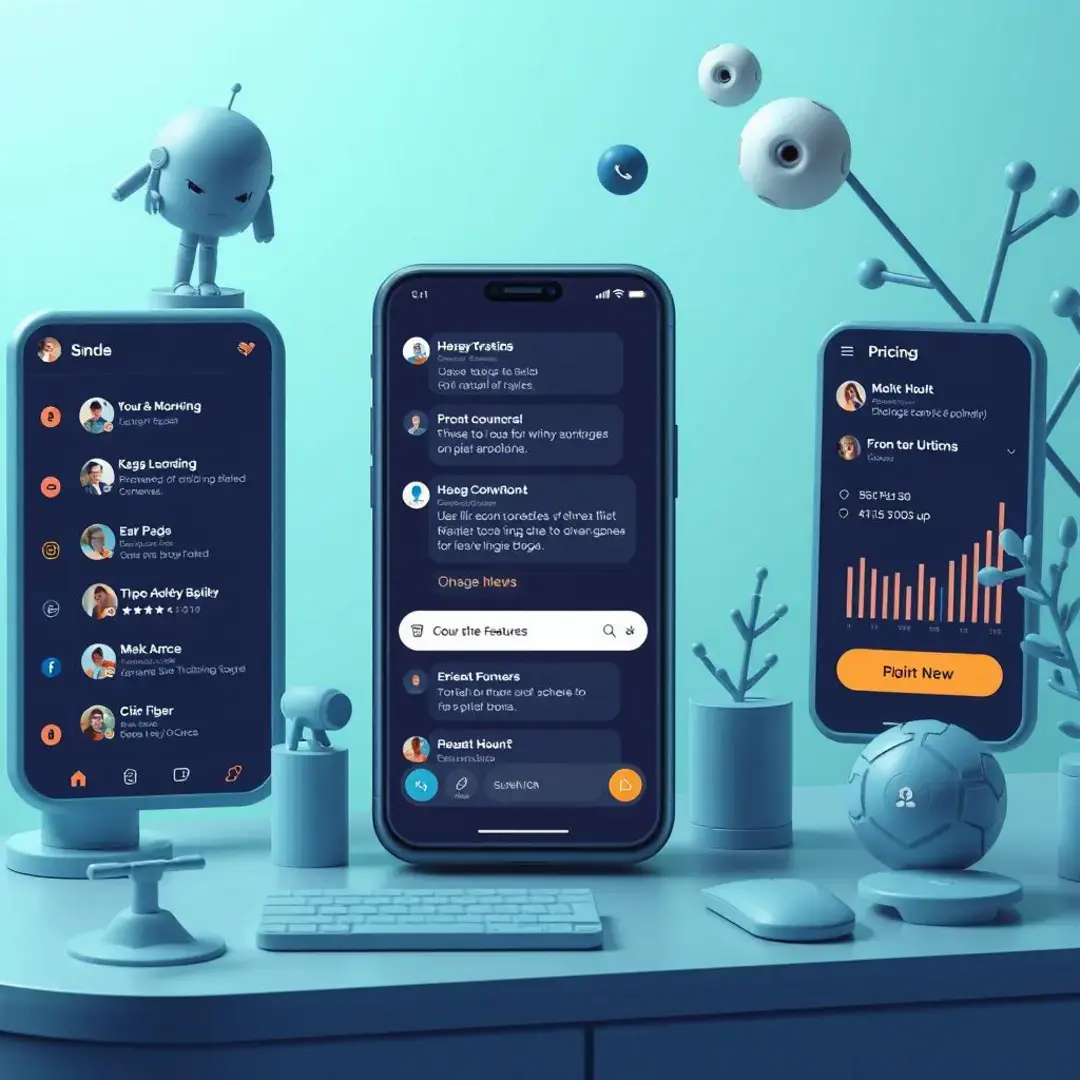Chatbots
Introduction

Overview of chatbots in customer support automation
In today’s fast-paced digital world, businesses are increasingly turning to chatbots to streamline their customer support operations. These automated systems utilize artificial intelligence to interact with customers, providing instant answers to frequently asked questions and guidance through various processes. By deploying chatbots, companies can significantly enhance their customer service capabilities, ensuring that assistance is available round-the-clock.
The rise of customer support automation has not only allowed businesses to save time and resources but also to improve engagement with their clients. As customer expectations continue to evolve, chatbots are fast becoming an essential tool in ensuring customer satisfaction and loyalty. In this article, we’ll dive into the latest trends, challenges, and future outlook of chatbots, along with effective strategies to choose the best chatbot application for your needs.
Key Trends in Chatbots

Emerging trends
One of the most significant advancements in chatbot technology is the evolution of natural language processing (NLP). This allows chatbots to understand and respond to user inquiries with greater accuracy and relevance. As NLP continues to improve, chatbots will become more adept at grasping context and sentiment, enhancing their ability to assist users effectively.
Personalization is now a critical factor in customer engagement, and chatbots are no exception. Businesses are leveraging data analytics to tailor responses according to individual customer profiles. This level of customization fosters a more engaging and satisfactory user experience, making customers feel valued and understood.
Modern chatbots are not standalone solutions; they are increasingly being integrated with various business systems, such as CRM tools and inventory management systems. This interconnectedness enables chatbots to access real-time data, allowing them to provide accurate information and assistance while streamlining internal processes.
Industry impact
Chatbots are drastically changing the landscape of customer service. By managing routine inquiries, they free up human agents to tackle more complex issues, ultimately transforming the efficiency of support operations. Companies that adopt chatbots can respond to customer needs more swiftly, leading to happier customers and improved service reputation.
The interactive nature of chatbots not only increases engagement levels but also enhances customer satisfaction. With features such as personalized dialogues and immediate responses, chatbots make it easier for customers to find solutions. This leads to a more positive overall experience that encourages future business interactions.
Implementing chatbots can significantly reduce operational costs for businesses. By automating repetitive inquiries, organizations can decrease the need for extensive customer support teams. This results in lower overheads while maintaining a high standard of service delivery, ultimately impacting the bottom line favorably.
Challenges and limitations
The proliferation of chatbots raises crucial concerns about data privacy and security. As chatbots handle sensitive customer information, ensuring data protection becomes paramount. Businesses must invest in robust security measures to safeguard against data breaches and comply with regulations.
While chatbots excel at managing simple inquiries, they can struggle with complex customer queries. There are instances where users prefer speaking to a human agent, especially for nuanced issues. Striking the right balance between automated responses and human assistance remains a challenge for many organizations.
Integrating chatbots effectively with current business systems can pose significant challenges. Businesses must evaluate their existing infrastructures and ensure that the chosen chatbot solution can work harmoniously with them. Failure to do so can lead to operational disruptions and reduced customer satisfaction.
Future Outlook

Future developments
The future of chatbots will see the rise of AI-powered solutions with enhanced capabilities. As AI technology continues to advance, chatbots will become more intelligent, able to perform increasingly sophisticated tasks while learning from every interaction. This evolution will lead to more efficient and versatile support systems.
Voice-activated chatbots are also gaining traction, providing alternative interactions beyond traditional text-based communications. This means users can engage with chatbots in a more natural way, enhancing usability. Multimodal chatbots will seamlessly integrate text, voice, and graphics, delivering an enriched user experience.
With advancements in predictive analytics and machine learning, future chatbots will provide hyper-personalized experiences. By analyzing user behavior and preferences, these chatbots will anticipate customer needs, enabling proactive assistance that enhances customer satisfaction and loyalty.
Market predictions
The chatbot market is expected to grow exponentially in the coming years as more businesses recognize their potential. The combination of AI advancements and consumer demand for efficient service is driving this growth. Analysts predict that industries such as retail, healthcare, and finance will particularly benefit from chatbot integration.
Beyond customer support, chatbots are finding applications in various industries, including e-commerce, healthcare, and hospitality. As these technologies evolve, organizations across sectors will increasingly adopt chatbots as part of their customer engagement strategies. This broad adoption will further fuel market expansion.
As the demand for chatbots continues to rise, new platforms and technologies will emerge, enhancing functionality and user experience. This evolution will create a more competitive landscape, fostering innovation and potentially reducing costs for businesses looking to adopt chatbot solutions.
Potential impact on users
Chatbots ultimately aim to enhance the customer experience by providing rapid, accurate assistance. With the ability to analyze data and learn from interactions, they can offer tailored responses that address specific user needs. This enhanced experience can lead to increased customer loyalty and advocacy.
One of the most appealing aspects of chatbots is their ability to offer 24/7 support. Customers can access assistance anytime, anywhere, eliminating traditional business hours. This level of availability is particularly beneficial for businesses with a global customer base, ensuring that support is always on hand.
Chatbots equipped with advanced analytics capabilities will be able to provide personalized and proactive assistance by predicting customer needs. This proactive approach not only resolves potential issues before they escalate but also crafts an experience that feels uniquely tailored to each user. The future of customer support looks promising with advancements in chatbot technology.
How to Choose the Right Chatbot App

Step-by-step guide
Start by defining your specific requirements for the chatbot. Consider factors such as the types of inquiries it should handle, target audience, and desired integrations. A well-defined set of requirements will guide your selection process and lead to a more successful deployment.
After determining your needs, conduct thorough research on available chatbot platforms. Compare their features, capabilities, and user reviews to identify those that match your requirements. This step is vital in narrowing down options and selecting the best fit for your organization.
Before fully committing, conduct a pilot test with your selected chatbot solution. This trial period will allow you to assess its performance and user experience in real-world scenarios. Gather feedback from users and make any necessary adjustments before the full rollout.
Once satisfied with the pilot, proceed with full implementation. Ensure that staff are trained to work alongside the chatbot, and monitor its performance closely. Regular assessments will help identify areas for improvement and ensure that your chatbot continues to meet business objectives.
Conclusion

As we have explored, chatbots are revolutionizing customer support automation through their efficiency, availability, and personalization capabilities. While challenges remain, the advancements in AI technology pave the way for an exciting future filled with enhanced customer experiences. Businesses that embrace chatbots will likely enjoy reduced operational costs, improved customer satisfaction, and a competitive edge in their respective markets.
In conclusion, selecting the right chatbot application demands careful consideration and understanding of your specific needs. The proactive and personalized nature of chatbots equips them to meet the evolving demands of consumers, positioning them as vital components in successful customer engagement strategies. As the landscape of customer support continues to evolve, chatbots will undoubtedly play a leading role in shaping the future of the industry.
Factors to consider
Selecting the right chatbot application starts with a clear understanding of your business needs and objectives. Identify what you want to achieve with the chatbot—whether it’s improving response times, enhancing customer satisfaction, or decreasing operational costs. Aligning your goals with the capabilities of the chatbot will ensure effective implementation.
Assessing the integration capabilities is crucial when choosing a chatbot app. The solution should seamlessly integrate with your existing systems, such as customer relationship management (CRM) tools and operational software. This compatibility will enhance the overall efficacy of the chatbot and streamline processes across your business.
As your business grows, so should your chatbot solution. Look for platforms that offer scalability and flexibility, allowing you to expand functionality as needed. Whether it’s adding new features or accommodating a larger user base, a scalable chatbot can evolve with your business.
Explore the various cost structures of chatbot solutions before making a decision. Be mindful of subscription fees, setup costs, and potential hidden charges. Choose a pricing model that aligns with your budget while still providing the necessary features and support to meet your requirements.





